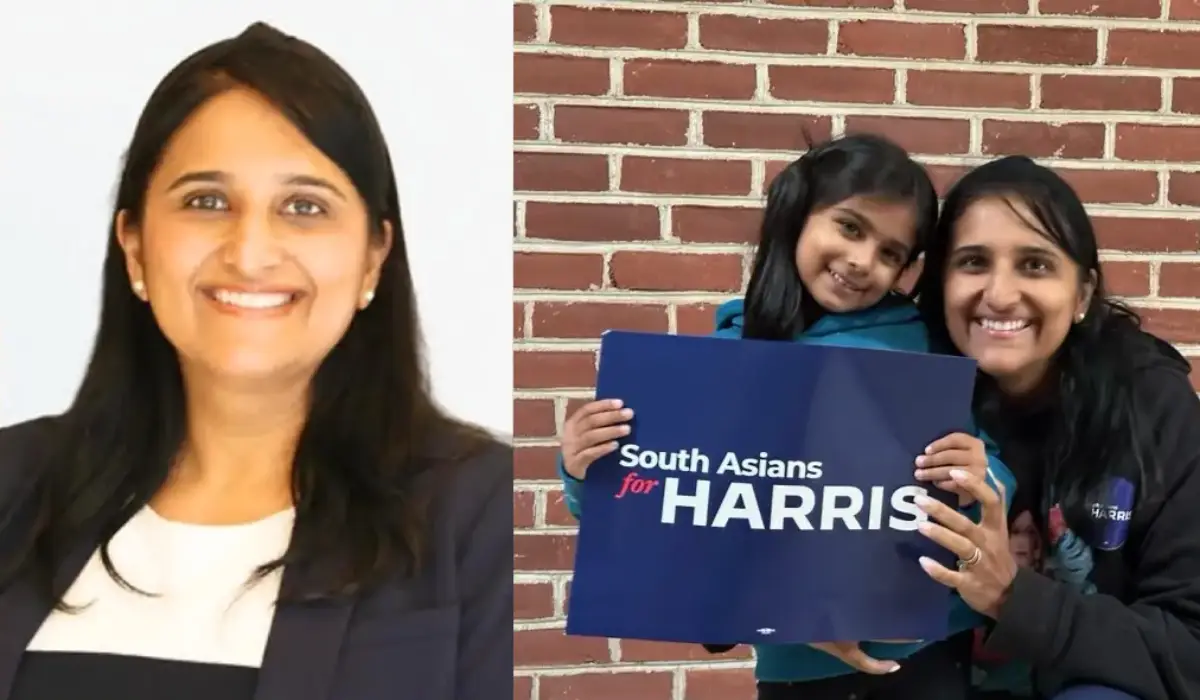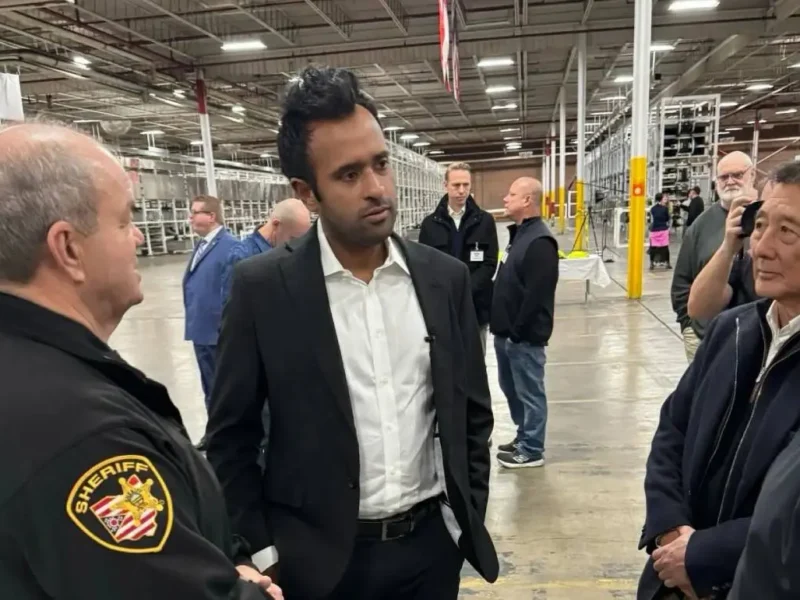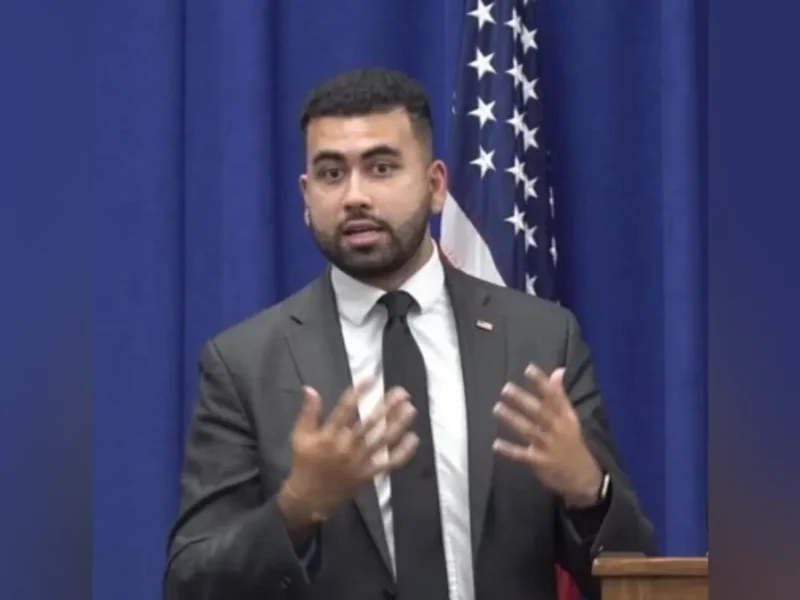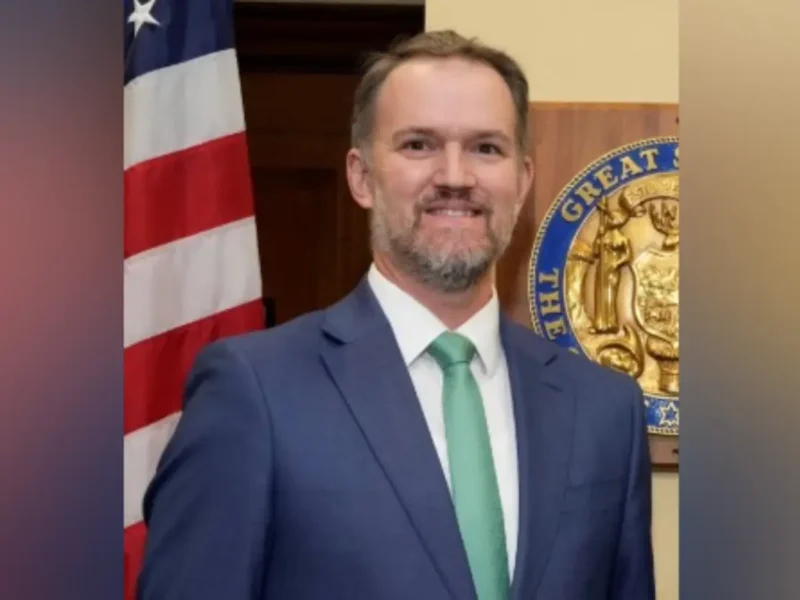Neha Dewan On What A Harris Presidency Could Mean For Representation
Neha Dewan, co-national director of South Asians for Harris, poses with her daughter.
By REENA RATHORE
In an act of curiosity that led to a moment both tender and transformative, Neha Dewan, co-national director of South Asians for Harris, held up a picture of Vice President Kamala Harris to her daughters and asked, “Who does she look like?” Her youngest, a mere two-year-old, looked at the image and proclaimed “Mommy!” Dewan, intrigued, repeated the experiment with her five-year-old, who echoed the same sentiment.
In that fleeting exchange, it became clear that Harris, with her biracial background and historic ascent, had become a mirror for these young girls. A symbol of what is possible. “That was very touching. This is not what I had when I was growing up,” Dewan, who is taking her oldest canvassing with her, told India-West. “But this is going to be their norm. And regardless of where she ends up, that says a lot.”
This anecdote perfectly encapsulates the far-reaching significance of representation in politics, but it isn’t just children seeing themselves in Harris. Across the South Asian community, there is a swelling sense of possibility and engagement. “It’s definitely energized the base,” Dewan explained. “Who’s ever made it to this platform? And that, too, especially being a woman and the fact that you could be part of history.”
As more and more South Asians get involved in the political process at various levels, from junior staffers to senior administration officials, a once-quiet electorate has found its voice. Dewan has seen firsthand how the movement has sparked the involvement of all generations.
“The aunties and uncles who probably just put their head down when they came into this country are now asking questions and saying, ‘Wow! there’s representation here.’ They are asking ‘What do the policies look like for us and how do we move the needle forward?’…Even younger people, like 12-14-16-year-olds, have come to us to get involved,” Dewan told India-West. “At 12, I was probably still playing with Barbie but they’re so much more mature but part of it is like they see that around them…”
Dewan reflected on how Indian Americans have become a more visible and powerful force in U.S. politics, noting that just a decade ago, the community was largely disengaged. “When Reshma Saujani ran for Congress in 2009, I remember thinking to myself, ‘Where’s our community? Why are we not behind her? Why are we so fragmented?’” she recalled, adding that many families were still focused on STEM careers, and civic engagement was not as common. The shift has been gradual but undeniable. “Today, I feel more supported, and I feel like I can support the community more.”
By 2012, Dewan was part of South Asians for Obama in New York, and between 2012 and 2016, the community’s political engagement increased significantly. In 2016, she launched South Asians for Hillary and in 2020, under her leadership, that culminated in the formation of South Asians for Biden.
This excitement isn’t just limited to identity politics; it’s also driven by key issues, including reproductive rights and immigration reform, specifically family reunification and expanding visas for skilled workers, that resonate deeply with the community. Aiming to benefit small business owners, she explained, Harris is proposing tax credits and initiatives to support “25 million new capital applications that she wants to finish by the end of the year.”
“From what I understand, Indian Americans have the highest number of abortions of the Asian American community in New York City. And I don’t know what the status is elsewhere, but that’s significant, too. And you’re talking about that being taken away…,” Dewan told India-West.
Despite the groundswell of enthusiasm, Dewan acknowledged that not all South Asian voters are easily swayed. Concerns about the economy and inflation remain at the forefront for many, and skepticism about her policies persists, much as it would for any candidate.
“I don’t think her just being South Asian is all of a sudden going to change people,” Dewan stated, adding that additionally, disinformation has caused confusion and sparked unnecessary fears.
“For example, there have been false claims circulating that Harris plans to impose a 44 percent tax on unrealized capital gains. That’s just ridiculous,” Dewan said. “…So people who are not necessarily researching policies see these snippets coming to the media and that’s what they believe. And South Asians for Harris is combating that misinformation by coming up with the correct stats and putting those graphics out in the social media.”
Dewan shared insights into the key initiatives that South Asians for Harris has implemented to mobilize support for Harris. She draws from her earlier work with South Asians for Biden, where they had established a highly organized and effective structure, including chapters, state directors, and specialized teams.
This multifaceted approach has been carried forward into her work for Harris, enabling a swift and effective relaunch of their organizational and engagement efforts.

The organization has grown, now boasting 24 chapters and a highly active youth engagement team, with volunteers contributing to various teams such as communications (bifurcated into various social media platforms and press), youth engagement, political advocacy, member outreach, grassroots organizing, and rapid response. Dewan emphasized that this organizational structure allows for sustainable engagement and continued efforts even when individual volunteers have other commitments.
Beyond this, they have a political director, a director of battleground states, and continue to host regular phone banking – Monday through Thursday – alongside text banking on Saturdays, in key states like Wisconsin, Georgia, Nevada and North Carolina.
“We’re now doing canvassing every single weekend in Pennsylvania and some other states…And then we’re doing virtual events,” Dewan shared, underscoring the urgency of their efforts. “We’re having speakers at these different phone banks and we’re working with the campaign and the DNC in terms of talking points and bringing that over and saying, ‘Ok, how do we get this down to the community?’”

A unique aspect of South Asians for Harris’ outreach is the translation of campaign materials into nine South Asian languages, ranging from Nepali and Bengali to Pashto.
Dewan emphasized that while her organization focuses on mobilizing South Asian support, the outreach extends beyond this community. She noted that during a recent canvassing trip in Pennsylvania, she engaged with white independent and Republican voters.
“It’s kind of across the aisle. And a lot of these conversations are happening in down-ballot races that are not necessarily South Asian, but very critical in those purple areas,” she told India-West. “We are definitely reaching a lot of different segments and definitely the broader AANHBI… It’s not a very siloed effort.”
Dewan highlighted that Harris’ presence on the ticket has galvanized diverse voter bases and activated communities. By working closely with community and faith leaders, Harris is able to address the concerns of a wide range of constituents, making her a unifying figure for different voter groups.
Calling President Trump’s rhetoric “pathetic and childish,” she dismissed his attempts to question Harris’ identity, noting that Harris is proudly both Black and Indian, and it should not matter in any case.
“Did you talk about Biden and what his background is? No. So why does it matter?” asked Dewan.
For her, Harris represents a “snowball effect” of excitement and possibility, saying “she brings a different spirit and a different flavor that looks like what America is today.”
She believes that Harris’ experience as a prosecutor, along with her multifaceted background, makes her a relatable and inspiring figure, adding that she’s just adding and building on that and on the other hand, “you have a convicted felon.”
Dewan attributed Harris’ post-debate surge to her composure and ability to clearly articulate her policies while challenging Trump’s controversial statements. She emphasized that this debate allowed voters to see Harris in action, particularly those less familiar with her.
Her message that division along racial, immigration, and gender lines should not define the country struck a chord, positioning her as a leader who seeks to bring people together rather than stoke divisions, said Dewan.
“There’s so much energy around her and that kind of catapults other people to do things… And I think what is also significant in the polls is where he’s leading, it’s not by a lot. And that says actually a lot about her because he’s been in the game for how long and the race is this close,” said Dewan.
The long-term impact of Harris’ candidacy goes beyond the election – it’s part of a broader movement towards a more inclusive and representative democracy, she stated.
“We’re getting braver and braver,” she remarked, expressing confidence in the community’s ability to push for policies that reflect their values. “If you don’t see people who look like you represented in the broad spectrum of things, then you feel isolated. We understand that we’re entitled to all of these things that other communities are and we’re pushing for that. New York State now has Diwali as a state holiday. If there was no representation, there was no push. Why would that happen?”





Sunjay
/
What does being half Indian have to do with her doing her job right for the last 4 years or the next 4 years ; by the she likes her steak medium rare and pork roast for dinner
October 4, 2024VIJAY
/
IT IS TIME OF GREAT PRIDE FOR ALL INDIAN AMERICANS. ANY AND ALL STATEMENT CONTRARY TO THIS FACT ARE INDEED SHAMEFUL ACTS!!!
October 4, 2024